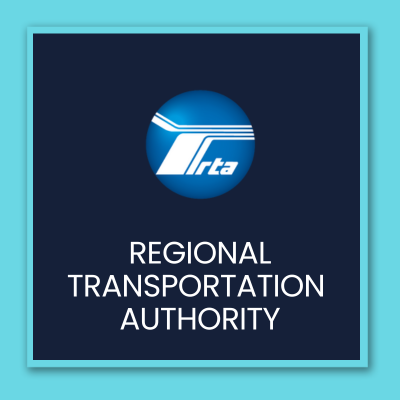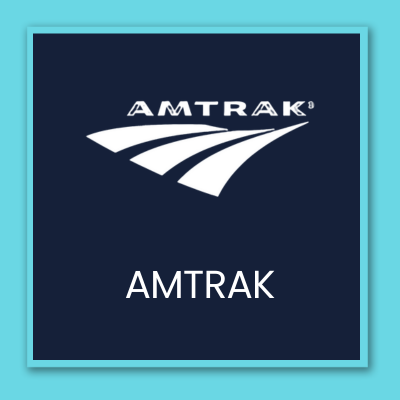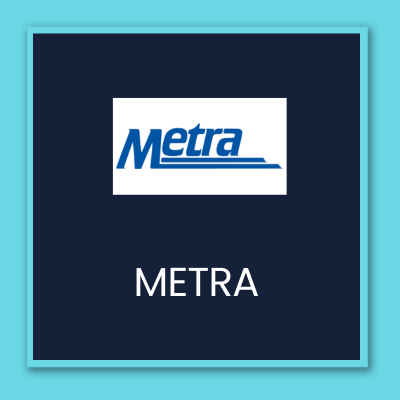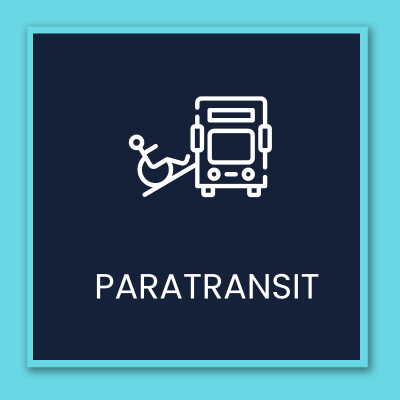Disability Transportation in the Chicagoland Area
As a person with a disability, you may qualify for free or reduced fares on many kinds of public transportation! Many kinds of disabilities qualify, not just those that may require a mobility aid like a white cane or wheelchair. For example, people with hearing, mental, visual, cognitive, or age-related disabilities may qualify, and people with episodic disorders may be eligible for an RTA Reduced Fare Permit based on functional abilities when the disorder is not under control.
Below, learn more about transportation options available in the Chicagoland area and the different accessibility features and disability-related programs each provide.
Transit Glossary
- Amtrak – Nationwide commuter rail operating out of Union Station
- Chicago Transit Authority (CTA) – The CTA operates buses and the Chicago “L” in the City of Chicago and some of its surrounding suburbs.
- Metra – Chicago-area commuter rail operating out of Ogilvy Transportation Center
- Pace – Provider of suburban bus routes and of paratransit services in the Chicago area. Pace is the suburban bus and regional paratransit division of the Regional Transportation Authority in the Chicago metropolitan area.
- Regional Transportation Authority (RTA) – The RTA is an agency that oversees the operations of the CTA, Metra, and Pace.
- Taxi Access Program (TAP) – The Taxi Access Program is operated by Pace and allows ADA Paratransit eligible riders immediate access to a Chicago taxi as an alternative to riding ADA Paratransit.
Table of Contents/Jump to Section

Regional Transportation Authority
RTA Key Takeaways
- People with disabilities of all kinds, including hearing, mental, visual, cognitive, age-related, and/or intermittent disabilities may qualify for free or reduced fare permits from the RTA.
- To be eligible for a Free Ride Permit, you MUST be enrolled in the Benefit Access Program (BAP) through the Illinois Department on Aging.
- If applying for a Reduced Fare Permit due to disability, proof of disability is required.
About the RTA
The Regional Transportation Authority (RTA) is a government agency created by the State of Illinois to coordinate transit in the Chicago area. The RTA oversees the operations of the Chicago Transportation Authority (CTA), Metra, and Pace. It services the Northeast Illinois counties of Cook, DuPage, Kane, Lake, McHenry, and Will.
The RTA also issues Reduced Fare and Ride Free permits, assesses eligibility for ADA Paratransit service, and oversees specialized travel training for people with disabilities and older adults.
By acquiring a permit through the Regional Transportation Authority (RTA), you can ride on the CTA, Metra, Pace, or use a taxi for free or with reduced fares.
RTA Free Ride Permits
- Older adults and people with disabilities who are enrolled in the Illinois Department on Aging’s Benefit Access Program (BAP) are eligible for a free ride permit which allows holders to ride free on the CTA, Metra, and Pace fixed-route services.
- Eligibility in the Benefit Access Program is required in order to be found eligible for the RTA Ride Free program.
- Once you have been found eligible for BAP, or if you already have been, you can complete the application for the RTA’s Free Ride Program.
How to Apply for a Free Ride Permit
- Enroll in the Benefits Access Program through the Illinois Department on Aging
- Apply for the RTA’s Free Ride Program:
- Apply Online using the RTA’s new online portal
- Call RTA Customer Service at (312) 913-3110 to have an application mailed to you
- Download the application from the RTA’s website
How to Apply for Benefits Access Program
- Apply for the Benefits Access Program Illinois Department of Aging’s website
- Call (800) 252-8966 or use TTY (800) 206-1327
- Information is also available at many senior centers, the Mayor’s Office for People with Disabilities, and Independent Living Centers (including Access Living).
RTA Reduced Fare Permits/How to Apply
Reduced Fare Permits are available for seniors, people with disabilities, and Medicare card holders. Proof of disability is required.
- Apply online through the RTA’s Online Application Portal
- Download an application for seniors or people with disabilities from the RTA’s website
- Have an application mailed to you: Call RTA Customer Service at (312) 913-3110
RTA Certification for Paratransit
The RTA also oversees the certification process for using ADA Paratransit. Individuals who are interested in using ADA Paratransit service must apply and be found eligible for paratransit according to ADA guidelines. The RTA handles ADA Paratransit Certification for the entire Chicago region to determine an individual’s functional ability to use fixed route services. To apply for ADA Paratransit certification, call (312) 663-4357.
To renew your paratransit certification, call (312) 663-4357
RTA Links
- Apply for ADA Paratransit certification through the RTA
- Main RTA Accessible Transit, ADA Paratransit, and travel training page
- RTA Discounted Fare and Ride Free Programs
- RTA Online application portal
- Illinois Department on Aging Benefits Access Program
- ADA Paratransit Certification Appeals Eligibility Review Board
- For paratransit recertification call (312) 663-4357.

Amtrak
Amtrak Key Takeaways
- Amtrak is a national passenger railway company. It operates in 46 of the 50 states.
- The accessibility of Amtrak stations varies. Always check to make sure any stations you are arriving at or departing from are accessible ahead of time.
- Before your trip, you can make a specific request for accessible service with Amtrak such as assistance with navigating the station, baggage, boarding, etc.
- Passengers with disabilities are eligible for an Amtrak rail fare discount. Documentation of disability is required. Amtrak offers a 10% discount for persons traveling with a passenger with a disability as a companion.
- Reservations are often required.
- Fares vary widely depending on your route and destination.
More About Amtrak:
- The accessibility of Amtrak stations varies greatly. To find out if the stations you will be using are accessible, check Amtrak’s website. NOTE: The best way to find accessibility information and to get any questions about accessibility answered seems to be to call Amtrak directly at 1-800-872-7245. TTY 1-800-523-6590.
- Before your trip, you can make a specific request for accessible service with Amtrak such as assistance with navigating the station, your bags, boarding/detraining, storing a mobility aid, getting to and from the restroom etc.
- You can request these services online at Amtrak.com, through the Amtrak mobile app, at a station ticket counter, or phone/TTY.
- NOTE: Amtrak train crews are not required or permitted to provide personal care assistance to passengers, such as feeding, dressing, medicating, or toileting.
- Further Reading: Examples of Accessible Services Requests
- Passengers with disabilities are eligible for an Amtrak rail fare discount. Documentation of disability is required.
- Amtrak offers a 10% discount for persons traveling with a passenger with a disability as a companion. Those designated as a companion must be capable of providing the necessary assistance to the passenger with a disability.
- Required medical devices such as wheelchairs, scooters, oxygen equipment, canes, walkers, etc. do not count towards your allowable baggage and is accepted free of charge if presented with a ticket issued at a mobility impaired fare.
When to make Reservations with Amtrak
Amtrak requests that passengers make reservations for any of the following, including on “unreserved trains” where reservations for standard seating is not required:
- Wheeled mobility device space (for when you will remain in your wheelchair during travel)
- Transfer accessible seats (for when you travel in a seat and stow your wheelchair)
- Accessible room accommodations
Helpful Amtrak Links
Accessibility
- Amtrak’s Accessible Travel Services
- Make an Accessible Travel Requests
- Traveling with a Companion/Attendant
- About Amtrak Station Accessibility
- Seating Options and Accommodations
- Wheeled Mobility Device Specifications and Services + What Each Train/Route can Accommodate
- Traveling with Oxygen Equipment on Amtrak
- Service Animals and Amtrak
- Accessible Thruway Bus Service
- Amtrak Quiet Cars
Fare Information
Fares vary greatly, but people with disabilities and one companion are eligible for discounted fares
Trip Planning
- Plan Your Amtrak Trip
- Making Reservations for People with Disabilities
- Find an Amtrak Station
- General Baggage Information and Services
- Mobility Equipment/Required Medical Devices in Baggage
- Personal Food, Beverages, and Medication
- Service Alerts and Notices
Service Alerts/Notifications
Further Reading: Making Reservations for Passengers with a Disability on Amtrak

The Chicago Transit Authority (CTA)
CTA Key Takeaways
- The Chicago Transit Authority (CTA) operates bus and ‘L’ trains in Chicago and some of its suburbs.
- All CTA busses and rail cars are accessible
- 71% of CTA rail stations are accessible. This means that there are rail stations that can only be accessed by stair, or have other significant accessibility barriers.
- According to the CTA’s All Stations Accessibility Program (ASAP) Strategic Plan, released in 2018, 100% of CTA rail stations will be accessible by the year 2050.
Helpful CTA Links
Accessibility
- Accessibility Features of the CTA
- Accessibility Status/Elevator Alerts
- ADA Advisory Committee
- CTA Accessible Transit Information
- Which CTA rail stations are accessible?
- Subscribe to CTA Updates
Fares/Ventra
- Fare Information
- Get started with with Ventra
- How-To Guide: Buying and Paying Fares
- Using Ventra on CTA/Pace
How-To Guides
Trip Planning

Metra
Metra Key Takeaways
- Metra is the commuter rail system in the Chicago metropolitan area serving the city of Chicago and its surrounding suburbs via the Union Pacific Railroad, BNSF Railway, and other railroads.
- Metra currently has 185 fully accessible stations, 44 inaccessible stations, and 13 partially accessible stations:
- Fully Accessible = The station, platform, ticket windows, train station buildings, bathrooms, and signage are fully accessible to people with disabilities and platform edges have tactile edges.
- Partially Accessible = Riders with wheelchairs are able to access the train platform from the street. HOWEVER, there may be barriers to accessing ticket windows, train shelters, train station buildings, and ramps. These stations can generally considered “usable” because they meet most accessibility standards.
- Inaccessible Stations = Do not have ramps or elevators. Usually elevated and only have stairs to reach the platforms.
- Note: Stations not listed in either of the menus below are fully accessible.
List of Inaccessible Metra Stations
Union Pacific North Line:
- Clybourn
- Ravenswood
- Indian Hill
- Hubbard Woods
Milwaukee District North Line:
- Grayland
- Mayfair
- Forest Glen
Union Pacific Northwest Line:
- Clybourn
- Gladstone Park
Milwaukee District West Line:
- Mannheim
Union Pacific West Line:
- Kedzie
- River Forest
BNSF:
- Halstead
- Western Avenue
- Congress Park
Rock Island Line:
- Gresham
- 123rd Street
- Prairie Street
Metra Electric Line:
- 18th Street
- 27th Street
- 47th Street-Kenwood
- 59th Street-University of Chicago
- 63rd Street
- 75th Street-Grand Crossing
- 79th Street-Chatham
- 83rd Street – Avalon Park
- 87th Street Woodruff
- 91st Street Chesterfield
- 95th Street – Chicago State University
- 103rd Street – Rosemoor
- 107th Street
- 111th Street – Pullman
- Riverdales
- 147th Street – Sibley
- Olympia Fields
- Matteson
Blue Island Branch:
- State Street
- Steward Ridge
- West Pullman
- Racine Avenue
- Ashland Avenue
- Burr Oak
List of Partially Accessible Metra Stations
Union Pacific North Line:
- Braeside
- Ravinia Park
- Riverside
- Brookfield
- Clarendon Hills
- Downers Grove-Fairview Avenue
- Rock Island Line:
- 95th Street-Longwood
- 91st Street-Beverly Hills
- 103rd Street-Beverly Hills
- 115th Street-Morgan Park
- 119th Street
Helpful Metra Links
Accessibility
- Accessibility landing page on Metra website
- List of Metra stations with elevators
- ADA Advisory Committee
- Metra ADA Advisory Committee Application
- Request for Reasonable Accommodation – Metra
- Metra Station Accessibility and Maps
Riders’ Guides
- Metra Rider’s Guide for Customers with Disabilities
- Metra Station Guide for Visually Impaired
- For New Metra Riders
Fare Information
Trip Planning
Trackers/Service Alerts

Pace
Pace provides ADA Paratransit in and around Chicago to people with disabilities who have been certified for ADA Paratransit by the RTA. Pace also provides other transportation options and services in the City and suburbs.
Helpful Pace Links
- Pace Contact Directory
- Pace ADA Advisory Committees
- Requests for Reasonable Accommodations
- Paratransit Certification
- If you need any Pace documents in an alternative format, please contact Pace Customer Relations.
- If you believe your ADA Paratransit Pace trip was excessively long, please submit an online report to Pace.
As of 2/19/24: Free Rides on Pace Fixed Routes for ADA Certified Riders!
- PLEASE NOTE: To ensure your ride is free, DON’T tap your ADA Paratransit card on the Ventra reader. Simply SHOW your card to the driver when you board.
- Pace On Demand, Pace Connect, ADA Paratransit, Taxi Access Program (TAP) and DuPage Uber trips are not included in the free fare program.
- Also, this free fare program does not cover CTA or Metra; however, ADA certified riders can still ride CTA, Metra and Pace’s On Demand services at a reduced rate.
As of 3/11/24: New Rideshare Access Program (RAP) for ADA Certified Riders
- With the Rideshare Access Program (RAP), ADA-eligible riders can receive a Pace subsidy for Uber or UZURV trips provided within the ADA service area.
Pace Transportation Options and Services
Pace Fixed Route Services
Key Takeaways:
- Operate on fixed routes and schedules
- Available to anyone, regardless of disability status
- All Pace buses are fully accessible
- Less expensive than ADA Paratransit
- AS OF 2/19/24: People who are certified for ADA Paratransit by the Regional Transportation Authority can now ride Pace fixed route buses for free.
Fares
- Fixed Route Service Pace Fares can be found here
- Seniors and people with disabilities may be eligible for free service or reduced fares through the RTA.
Accepted Forms of Payment
- Ventra Card/App
- Mobile Banking
- Contactless Bank Card
- Cash (+ surcharge)
Resources
Pace On Demand
Key Takeaways:
- Pace On Demand is reservation-based, shared-ride service in 10 designated service areas throughout the suburbs
- Available to all members of the public, not just people with disabilities
- Book online or call to reserve your trip at least one hour ahead of time
- Pick-ups and drop-offs happen in most efficient order geographically
Fare
- $2 per one-way ride
- Seniors and people with disabilities may be eligible for free service or reduced fares through the RTA.
Accepted Forms of Payment
- Ventra
- Cash (exact fare required)
- Contactless bank card/mobile wallet
Resources
Pace ADA Paratransit
Key Takeaways:
- Operates on variable routes,depending on riders’ points of origin and their destinations.
- Riders MUST be certified by the RTA
- Reservations are required at least 24 hours in advance
- Only operates on the same days and times as mainline, fixed-route service in the rider’s geographic location
Fare
- $3.25
Resources
- Pace Paratransit Services Overview Portal
- Get Certified for Paratransit
- Paratransit Tripcheck
- Using Ventra on Paratransit
- Pace Paratransit Guidelines
- Buy Paratransit Tickets
- Role of Pace Drivers
If you need any Pace documents in an alternative format, please contact Pace Customer Relations.
If you believe your trip was excessively long, please submit an online report to Pace.
Pace Dial-a-Ride
Key Takeaways
- Some villages, townships, or counties partner with Pace to provide expanded paratransit service called Dial-a-Ride in certain areas.
- Dial-a-Ride programs have different rules on fares, geographic boundaries and passenger eligibility based on each individual town or county.
Resources
- Full information on Pace Dial-a-Ride Services available here.

What is Paratransit?
The Americans with Disabilities Act (ADA) requires public transit agencies that provide fixed-route service (such as the services provided by the Chicago Transit Authority and Metra) to provide comparable services to people with disabilities who, due to disability, cannot use existing fixed-route bus or rail services.
These comparable transportation services for people with disabilities are often referred to as “paratransit” or “ADA Paratransit.”
Chicago-Area Paratransit
Pace Suburban Bus (Pace) is the primary provider of public transportation services in the Chicago suburbs; fixed-route Pace buses are available to residents of Cook, Will, Dupage, Kane, Lake, and McHenry Counties. All fixed-route Pace buses are accessible to people with disabilities.
However, for people with disabilities who cannot use one of the fixed-route transit options, Pace also provides ADA Paratransit in and around Chicago. This means that people with disabilities in the City of Chicago or in one of the Chicago suburbs can make advance reservations and arrangements to be picked up and dropped off by a Pace Paratransit vehicle.
NOTE: Only people who are certified by the Regional Transportation Authority are eligible to ride ADA Paratransit.
Getting Certified for Chicago Paratransit
Individuals who are interested in using ADA Paratransit services must apply and be found eligible for paratransit according to ADA guidelines. The RTA handles ADA Paratransit Certification for the entire Chicago region to determine an individual’s functional ability to use fixed route services.
Participants must be recertified every four years.
Apply for Certification
The RTA launched an updated certification process in 2023 to streamline the certification and recertification process. Below is a broad overview of the steps you need to take if you are interested in the RTA Paratransit Certification Program:
- Call the RTA Paratransit Certification Program at (312) 663-4357)
- Answer a few screening questions
- The RTA will then mail you a flyer that explains the program in more detail.
- If you want to continue the application process, call the RTA to schedule an in-person interview.
- TIP: Transportation to and from your interview will be provided for free if requested. Bring a photo ID to your interview.
- You may be asked to complete a physical assessment in addition to answering questions about yourself and your ability to use mainline transportation.
Recertification:
- Call the RTA helpline to schedule a 30 minute phone interview: (312) 663-4357
- RTA staff will call you for your interview and ask you screening questions to determine if you are still eligible for ADA Paratransit service.
RTA Contact Information:
- Hours: Monday – Friday, 8AM – 5PM
- Phone: (312) 663-4357

Taxi Access Program (TAP)
The Taxi Access Program (TAP) is operated by Pace and requires the same ADA Paratransit certification mentioned in the section on the RTA.
Pace’s Taxi Access Program (TAP) allows ADA Paratransit eligible riders immediate access to a Chicago taxi as an alternative to riding ADA Paratransit. Note: Taxicab drivers are independent contractors and do not work for Pace nor the City of Chicago.
- TAP can be a great way to travel for last-minute plans.
- Unlike ADA Paratransit, there’s no need to reserve a trip a day in advance. You can call or hail a taxi at your convenience.
- For a list of taxi providers, please call 311.
How to Apply
- Obtain ADA paratransit certification through the RTA
- Fill out the form on Pace’s TAP webpage. Have your paratransit ID card number handy.

Travel Training/Ridership Assistance
The RTA offers free services, including: transit orientation presentations for groups, information assistance at outreach events and resource fairs, and one-on-one travel training to individuals in their communities.
If you are an older adult or a person with a disability and want to learn more about taking accessible CTA, Metra, and Pace public transit, the RTA’s Travel Training Program may be for you. During your free one-on-one sessions, you will meet with a professional Travel Trainer from the RTA who:
- Has experience with older adults and people with disabilities
- Can explain accessibility features on transportation (ramps, lifts, signage, etc.)
- Teaches you how to use the public transit system
- Assists you with planning your trip
- Accompanies you while you are learning your trip
- Is certified in Orientation & Mobility, for participants who are blind or have low-vision
The RTA also does free group presentations on accessible transit options, trip planning, the RTA Free Ride or Reduced Fare Programs, and other topics customized to each audience. Call (312) 913-3120 or email [email protected] for more information and to request Travel Training.

